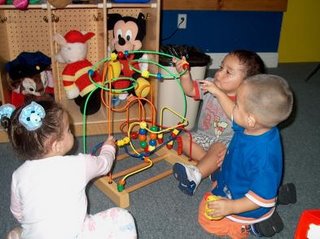Child Development
Child development provides parents with information on physical, mental and emotional growth and development in children. Child development information can help parents know when they are expecting too much from a child as well as become aware of lags in development that may benefit from professional help.
Sunday, September 03, 2006

Young children are curios and they ask hard questions. Infants and toddlers learn about the world by active exploration. They frequently ask “Why” and “How come?” An early childhood educator who expects to follow a teaching manual or a lesson-planning guide to teach young children will have many surprises. Young children are just as likely to ask a question about the cosmos as they are to ask why blue and yellow paint mixed together make green. Teachers do not need to know all the answers to children’s questions but must appreciate their inquiring minds and spirits and be prepared to help children become involved in a learning process to find the answers they seek. Teachers of young children must be intelligent, knowledgeable, sensitive, curios and respectful of children’s needs to know. These teachers will create a classroom environment where children can learn concepts and ideas through play as well as explore situations and solve problems together through play. Children do not make an idea or concept fully their own by just hearing about it. They must have the opportunity to touch, taste, smell, move, manipulate and explore in order to completely grasp the meaning of a new concept.
Play allow young children to manipulate objects, participate in activities, try out new ideas, practice solutions to problems, satisfy their curiosity, create new inventions and develop their recall of events. A flexible and open atmosphere also support children’s sense of playfulness and delight in learning. Have you ever seen a child who wanted to stop playing?
posted by Fauziah at
12:35 AM

0 Comments:




